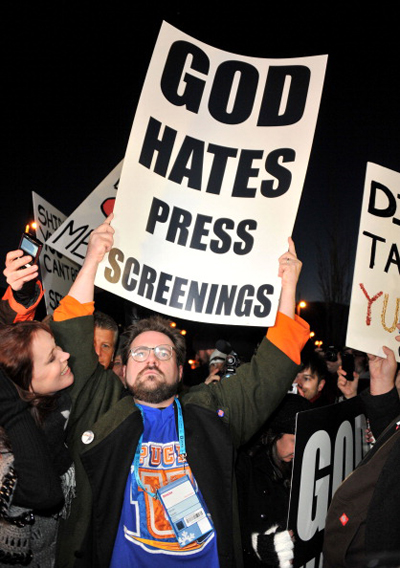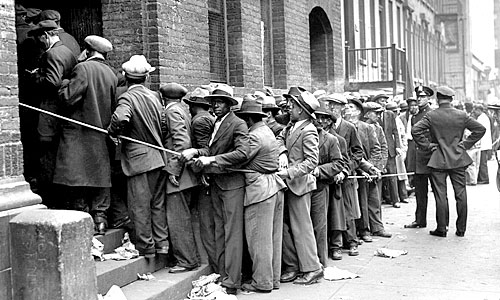This post spawned directly from my review of Red State. A better question is why? Why did one specific
movie review lead to this post which is far more broad in scope and
scale? I've seen many movies and none of the others inspired me to
write about the changing of an industry or consumer demand. So why
Red State?
Because Red State should change the
world.
I say should and not did only because
it seems to be taking a little longer than I, personally, would like
it to. This is because the movement is lead by a man who gave the
middle finger to entertainment media, and any time you choose to do
things in a non-traditional route it's going to take some time.
Here's what Red State did. When it
premiered at Sundance Kevin Smith promised an auction for the rights
to his movie, which is very traditional. Where Mr. Smith broke the
mold is when he allowed only one bid on the movie rights...his own
bid...for $20. Then he caused wave upon wave by saying that he didn't
need the traditional marketing/distributing companies and was
planning on distributing the movie by himself.
 |
| He also protested |
This is a review for some but new
information for others: Companies spend way to much money marketing
movies. For a film like Red State, that had a $4 million budget,
marketing costs would have probably been in the $10-15 million dollar
range. I'm dead serious. A distributing company would have spent more
than twice the cost of the movie just to advertise it.
The worst part is that niche-films
rarely have the audience to make up for those kinds of cost at the
box-office. Then they are deemed a failure when they don't make more
than $20 million dollars in a weekend. This happens all the time.
(Most recently to Our Idiot Brother starring Paul Rudd).
Mr. Smith realized this and did the
only sane thing...he told everyone else they were insane.
Why should he subject his movie, his
artwork, to another declared failure when he could do it a different
way and be more financially successful?
The crazy thing: He already has his
money back. Every single cent that Red State makes on VOD (video on
demand), on DVD/Blu Ray or at select theaters is profit. Before Red
State was even released to a general audience, it had recouped it's
cost.
How did Mr. Smith do this? He kept
costs low and took the film around to select theaters where his own
fans paid a premium to see the film and his Q&A.
I know, baffling concept. A director
went around and showed off his work to people he knew were fans.
Instead of paying millions and millions of dollars to get a few extra
asses in seats opening weekend, Mr. Smith just said, "No thanks,
I don't need to do that."
It worked because Mr. Smith understands
something that others don't. Different movies work for different
audiences in different places. Putting every movie through the same
cookie cutter doesn't work.
 |
| Harry Potter 7 premiere |
Here's the top ten highest grossing
movies of all time. A pretty good barometer of what is "popular"
in the United States.
- Avatar
- Titanic
- Harry Potter and the Deathly Hallows - Part 2
- The Lord of the Rings: The Return of the King
- Transformers: Dark of the Moon
- Pirates of the Caribbean: Dead Man's Chest
- Toy Story 3
- Pirates of the Caribbean: On Stranger Tides
- Alice in Wonderland
- The Dark Knight
All pretty predictable. No real
surprises. Now here's a list of the top ten rentals from Netflix.
Also a pretty good barometer of what is "popular" in the
United States.
- Crash (2004)
- The Blind Side (2009)
- The Curious Case of Benjamin Button (2008)
- The Bucket List (2008)
- The Departed (2006)
- The Hurt Locker (2008)
- Iron Man (2008)
- Sherlock Holmes (2009)
- No Country for Old Men (2007)
- Gran Torino (2008)
WHAT!?! Not one of the highest grossing
movies is on the Netflix list. Are people insane? Don't they realize
the superior quality of Transformers: Dark of the Moon?!? It made
over a billion dollars!
That's about all the proof I need to
know that different movies work for different audiences in different
places. Movie theaters are great for watching things explode or
seeing the crazy visuals of Avatar, but that doesn't always translate
when people are at home.
Red State was never going to be in the
Top Ten Box Office numbers, but a distributing company would have
marketed it the same way; by throwing copious amounts of money trying
to attract more and more people. By choosing a desired "target
audience" and overplaying the generalities they believe that
audience wants.
Sex to young men. Romance to young
women. Goofy antics of middle-aged people to middle-aged people who
don't have goofy antics. Intellect to...never mind, no movie gets
marketed as an intellectual experience.
 |
| I like unrealistic women |
 |
| I like unrealistic men |
 |
| I like unrealistic versions of myself |
Red State should change the world of entertainment. People should look at what Mr. Smith has done and realize that different movies can be distributed in different fashions. Fans will pay to see movies they want to see, but even more so if it is available in a fashion they are comfortable with.
What's more comfortable than having a
movie streamed directly to your computer, Xbox, or PS3 and watching
it from your own couch? Not much in my book.
Different movies play to different
audiences in different places. Mr. Smith tailored the distribution to
best fit the people he thought would enjoy Red State. He listened to
the people whom he respects, his own fans.
Another baffling concept. Listening AND
responding to the people who are actually interested in your work.
 |
| The best Web 2.0-ers. Look at those ears. |
That's Web 2.0. Skipping over the
unneeded middle men and going directly to the source. Being
responsible to the fan by communicating directly with the fans.
Mr. Smith took advantage of all the
different mediums now available to us as consumers. Red State can be
watched on iTunes, Xbox, PS3 or YouTube. It can be watched by anyone
who wants to watch it in the comfort of their own home. And it should
change how the world consumes, interacts and views entertainment.
At least I hope it does.